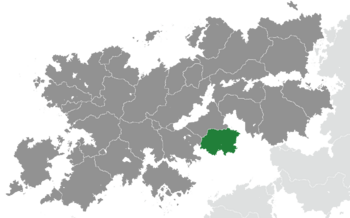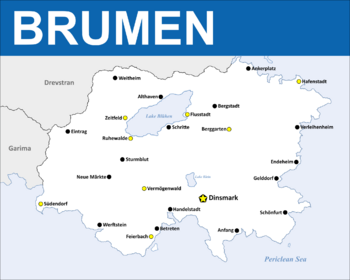Brumen: Difference between revisions
No edit summary |
No edit summary |
||
| Line 40: | Line 40: | ||
|ethnic_groups = Brumen 81%<br>Lushyod 12%<br>Ludz 3%<br>Gariman 2.8%<br>Greznean 1.2% | |ethnic_groups = Brumen 81%<br>Lushyod 12%<br>Ludz 3%<br>Gariman 2.8%<br>Greznean 1.2% | ||
|ethnic_groups_year = 2020 | |ethnic_groups_year = 2020 | ||
|religion = {{wp|irreligion|Irreligious}} 67%<br>[[Aletheic Church]] 33% | |||
|demonym = Brumen | |demonym = Brumen | ||
|government_type = {{wpl|Federation|Federal}} {{wpl|Parliamentary System|Parliamentary}} {{wpl|Constitutional Monarchy}} | |government_type = {{wpl|Federation|Federal}} {{wpl|Parliamentary System|Parliamentary}} {{wpl|Constitutional Monarchy}} | ||
| Line 124: | Line 125: | ||
'''Brumen''', officially the '''Kingdom of Brumen''' ({{wp|german language|Brumen}}: ''Königreich Brumen''), is country located in [[Ajax|South-East Belisaria]]. Brumen is a {{wpl|Federation|federal}} {{wpl|Parliamentary System|parliamentary}} {{wpl|constitutional monarchy}} and is comprised of nine {{wp|administrative division|federal states}}. Its location at South-East Belisaria connects its entire coastline to the [[Periclean Sea]]. The country shares land borders with [[Garima]] to the north west, [[Drevstran]] to the North as well as a maritime border with [[Greznea]] to the north east. Brumen covers an area of 334,912 km<sup>2</sup> (129,310 sq mi) and has a population of 32 million people, making it one of the less-populated countires compared to its immediate neighbors. Brumen's {{wp|exclusive economic zone|exclusive economic zone (EEZ)}} extends 200 {{wp|nautical miles}} from the continent's baseline and covers an area of approximately 764.876 km<sup>2</sup> (475,272 sq mi). During the {{wp|classical antiquity|classical}} and {{wp|late antiquity}} eras Brumen was part of [[Tervingia]], a gothic political state and significant cultural power in East Belisaria that existed from 323 BCE until its dissolution in 429 CE. Due to this the nation has strong-gothic roots. However after Tervingia's dissolution the gothic peoples that inhabited present-day lands of Brumen developed its own unique Gothic-derived cultural identity that is distinct from its neighbors. The nation's capital is [[Anfang]] whereas its financial center and largest city is [[Wohlstand]]. | '''Brumen''', officially the '''Kingdom of Brumen''' ({{wp|german language|Brumen}}: ''Königreich Brumen''), is country located in [[Ajax|South-East Belisaria]]. Brumen is a {{wpl|Federation|federal}} {{wpl|Parliamentary System|parliamentary}} {{wpl|constitutional monarchy}} and is comprised of nine {{wp|administrative division|federal states}}. Its location at South-East Belisaria connects its entire coastline to the [[Periclean Sea]]. The country shares land borders with [[Garima]] to the north west, [[Drevstran]] to the North as well as a maritime border with [[Greznea]] to the north east. Brumen covers an area of 334,912 km<sup>2</sup> (129,310 sq mi) and has a population of 32 million people, making it one of the less-populated countires compared to its immediate neighbors. Brumen's {{wp|exclusive economic zone|exclusive economic zone (EEZ)}} extends 200 {{wp|nautical miles}} from the continent's baseline and covers an area of approximately 764.876 km<sup>2</sup> (475,272 sq mi). During the {{wp|classical antiquity|classical}} and {{wp|late antiquity}} eras Brumen was part of [[Tervingia]], a gothic political state and significant cultural power in East Belisaria that existed from 323 BCE until its dissolution in 429 CE. Due to this the nation has strong-gothic roots. However after Tervingia's dissolution the gothic peoples that inhabited present-day lands of Brumen developed its own unique Gothic-derived cultural identity that is distinct from its neighbors. The nation's capital is [[Anfang]] whereas its financial center and largest city is [[Wohlstand]]. | ||
Originally a decentralized collection of various kingdoms located in Brumen's present-day lands, the threat of [[Holy Audonian Empire|Audonian]] invasions during the Conquest of Garima between the 11th and 12th centuries as well as during the Alban Crusades of the 12th and 13th centuries, prompted the most powerful of these kingdoms: the [[Kingdom of Waldreich]] to rally the smaller Kingdoms together. Spearheaded by Waldreich, this military alliance thwarted the first attempted invasion during the Conquest of Garima. After this first victory Waldreich sought to establish itself as the dominant political, military and economic force of the southern lands. Estabalished in 1198, the [[Allied Kingdoms of Brumen]] was Waldreich's first attempt to unify the region and was established as a loose association of the various kingdoms. The level of economic & political integration under the Allied Kingdoms was minimal and each kingdom was largely free to pursue its own foreign policies. During this time religion was one of society's central pillars with all kingdoms of the alliance adhering to the [[Aletheic Church]] as the state religion of the area. However the Alban Crusades of the 12th and 13th centuries would lead to significant changes. Experiencing first hand of the effects of wars of conquest caused by religious beliefs, the Allied Kingdoms sought to diminish the influence. The Allied Kingdoms was dissolved and in its place the Kingdom of Brumen was formed. Led by Waldreich, the founders of the Kingdom wrote down the [[Articles of Union (Vereinsartikel]] establishing Brumen as a sovereign nation representing nine constituent states, Waldreich's status was elevated as first among peers as it spearheaded the defense of the Allied Kingdoms with the Monarch of Waldreich serving as the monarch of Brumen. The Articles of Union explicitly left out the usage of divine right, or God's will, strongly implying the {{wp|separation of the church and state}}. | |||
Revision as of 16:02, 1 March 2022
This article is incomplete because it is pending further input from participants, or it is a work-in-progress by one author. Please comment on this article's talk page to share your input, comments and questions. Note: To contribute to this article, you may need to seek help from the author(s) of this page. |
Kingdom of Brumen Königreich Brumen | |
|---|---|
| Motto: Einheit, Wohlstand, Frieden ("Unity, Prosperity, Peace") | |
| Anthem: Vorwärts Brumen Forward Brumen | |
 Location of Brumen highlighted in dark green Continent of Belisaria highlighted in dark grey. | |
 Political Map of Brumen | |
| Capital | Anfang |
| Largest Metropolitan Area | Anfang Metropolitan Area |
| Official languages | Brumen |
| Recognised regional languages | Losh Gariman Gresiye |
| Ethnic groups (2020) | Brumen 81% Lushyod 12% Ludz 3% Gariman 2.8% Greznean 1.2% |
| Religion | Irreligious 67% Aletheic Church 33% |
| Demonym(s) | Brumen |
| Government | Federal Parliamentary Constitutional Monarchy |
• Monarch | Anne-Marie I |
• Chancellor | Immanuel Vogel |
• Chief Justice | Brigitte Schäfer |
| Legislature | Vollksrat |
| Bundeskonklave | |
| Bundeskongress | |
| Establishment | |
• Treaty of XX | TBC |
• Treaty of XX | TBC |
• Treaty of XX | TBC |
• Articles of XX | TBC |
| Area | |
• Total | 334,912 km2 (129,310 sq mi) |
• Water (%) | 7.95 |
| Population | |
• 2020 estimate | 35,784,336 |
• 2020 census | 32,893,755 |
• Density | 98.21/km2 (254.4/sq mi) |
| GDP (PPP) | 2020 estimate |
• Total | |
• Per capita | |
| GDP (nominal) | 2020 estimate |
• Total | |
• Per capita | |
| Gini (2020) | 28.3 low (7th) |
| HDI (2020) | high |
| Currency | Bon (Bn) |
• Summer (DST) | Not Observed |
| Date format | DD/MM/YYYY |
| Driving side | left |
| ISO 3166 code | BRU |
| Internet TLD | .bru |
Brumen, officially the Kingdom of Brumen (Brumen: Königreich Brumen), is country located in South-East Belisaria. Brumen is a federal parliamentary constitutional monarchy and is comprised of nine federal states. Its location at South-East Belisaria connects its entire coastline to the Periclean Sea. The country shares land borders with Garima to the north west, Drevstran to the North as well as a maritime border with Greznea to the north east. Brumen covers an area of 334,912 km2 (129,310 sq mi) and has a population of 32 million people, making it one of the less-populated countires compared to its immediate neighbors. Brumen's exclusive economic zone (EEZ) extends 200 nautical miles from the continent's baseline and covers an area of approximately 764.876 km2 (475,272 sq mi). During the classical and late antiquity eras Brumen was part of Tervingia, a gothic political state and significant cultural power in East Belisaria that existed from 323 BCE until its dissolution in 429 CE. Due to this the nation has strong-gothic roots. However after Tervingia's dissolution the gothic peoples that inhabited present-day lands of Brumen developed its own unique Gothic-derived cultural identity that is distinct from its neighbors. The nation's capital is Anfang whereas its financial center and largest city is Wohlstand.
Originally a decentralized collection of various kingdoms located in Brumen's present-day lands, the threat of Audonian invasions during the Conquest of Garima between the 11th and 12th centuries as well as during the Alban Crusades of the 12th and 13th centuries, prompted the most powerful of these kingdoms: the Kingdom of Waldreich to rally the smaller Kingdoms together. Spearheaded by Waldreich, this military alliance thwarted the first attempted invasion during the Conquest of Garima. After this first victory Waldreich sought to establish itself as the dominant political, military and economic force of the southern lands. Estabalished in 1198, the Allied Kingdoms of Brumen was Waldreich's first attempt to unify the region and was established as a loose association of the various kingdoms. The level of economic & political integration under the Allied Kingdoms was minimal and each kingdom was largely free to pursue its own foreign policies. During this time religion was one of society's central pillars with all kingdoms of the alliance adhering to the Aletheic Church as the state religion of the area. However the Alban Crusades of the 12th and 13th centuries would lead to significant changes. Experiencing first hand of the effects of wars of conquest caused by religious beliefs, the Allied Kingdoms sought to diminish the influence. The Allied Kingdoms was dissolved and in its place the Kingdom of Brumen was formed. Led by Waldreich, the founders of the Kingdom wrote down the Articles of Union (Vereinsartikel establishing Brumen as a sovereign nation representing nine constituent states, Waldreich's status was elevated as first among peers as it spearheaded the defense of the Allied Kingdoms with the Monarch of Waldreich serving as the monarch of Brumen. The Articles of Union explicitly left out the usage of divine right, or God's will, strongly implying the separation of the church and state.


